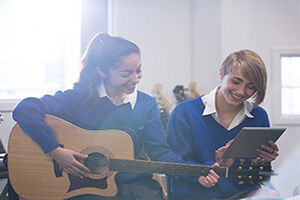University News Last updated 28 September 2023

Research Professor within the College of Education and Social Work Martin Fautley has co-edited a book on teaching music composition in schools across a wide range of countries.
The Routledge Companion to Teaching Music Composition in Schools – International Perspectives was published in August. Other co-editors are RBC Visiting Lecturer Kirsty Devaney, Professor Joana Grow from the Hochschule für Musik Theater und Medien, Hannover, and Professor Annette Ziegenmeyer at the University of Wuppertal.
The book offers an overview of teaching composing from a wide range of countries around the world. It addresses the current state of composition pedagogy from primary to secondary school levels and beyond. Different curricular and extracurricular settings, cultural aspects of composing, aesthetics, musical creativity, the role of technology, and assessment are some of the topics that are explored.
With contributors from more than 30 countries who are educators, composers and researchers, the book encompasses theoretical, historical, empirical, and practical approaches, and enables comparisons across different countries and regions.
Chapters by experienced educators, composers, and researchers describe in depth the practices taking place in different international locations. Interludes by the volume editors contextualise and problematise the teaching and learning of composing music.
Providing a wide-ranging and detailed review of international approaches to incorporating music composition in teaching and learning, this book is a useful resource for teachers, music education researchers, graduate and undergraduate students, and all those working with children and young people in composing music.
Martin said: “This is an under-researched area, and we wanted to collect together thinking from around the world as to what is taking place, providing not only descriptions of what is going on, but importantly also to theorise practice.”